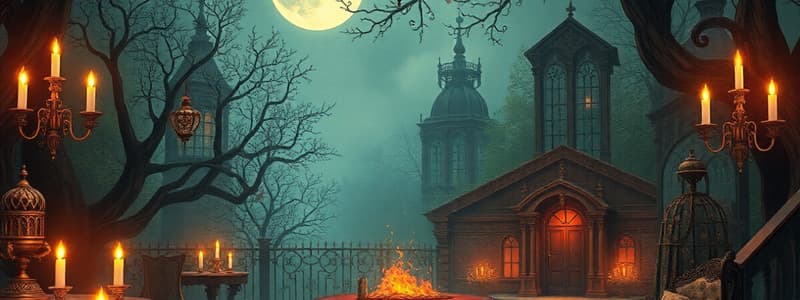Podcast
Questions and Answers
What is a key aspect of atmosphere in English Horrors?
What is a key aspect of atmosphere in English Horrors?
- Cheerful and inviting environments
- Futuristic and technologically advanced backdrops
- Bright and colorful settings
- Dark, eerie settings in desolate landscapes (correct)
Which theme is commonly explored in English Horrors?
Which theme is commonly explored in English Horrors?
- Unity and friendship
- Joy and celebration
- Mortality and existential dread (correct)
- Prosperity and success
Which of the following authors is known for pioneering the horror genre?
Which of the following authors is known for pioneering the horror genre?
- Henry James
- Mary Shelley (correct)
- Algernon Blackwood
- Bram Stoker
What type of creatures are commonly featured in English Horrors?
What type of creatures are commonly featured in English Horrors?
What does the theme of duality in English Horrors refer to?
What does the theme of duality in English Horrors refer to?
Which of the following works is NOT associated with English Horror literature?
Which of the following works is NOT associated with English Horror literature?
What critical societal issues do English Horrors often address?
What critical societal issues do English Horrors often address?
Which characteristic of English Horrors is emphasized in their language?
Which characteristic of English Horrors is emphasized in their language?
Flashcards are hidden until you start studying
Study Notes
Definition
- English Horrors refer to a genre of literature and cinema that explores themes of fear, the supernatural, and the macabre within an English cultural context.
Key Elements
- Atmosphere: Dark, eerie settings often in desolate landscapes or historic buildings.
- Supernatural: Ghosts, monsters, and otherworldly creatures are commonly featured.
- Psychological Tension: Focus on the mental state of characters, blurring the lines between sanity and madness.
- Social Commentary: Many works critique societal issues through horror narratives.
Notable Works
-
Literature
- Frankenstein by Mary Shelley
- Dracula by Bram Stoker
- The Turn of the Screw by Henry James
- The Haunting of Hill House by Shirley Jackson
- The Woman in Black by Susan Hill
-
Film
- The Innocents (1961)
- The Witch (2015)
- The Others (2001)
- 28 Days Later (2002)
Common Themes
- Isolation: Characters often face physical or emotional isolation.
- Mortality: Exploration of death, decay, and existential dread.
- Duality: The conflict between appearance and reality; what seems normal might hide dark truths.
- Fear of the Unknown: The terror of facing what cannot be understood.
Key Authors and Influencers
- Mary Shelley: Pioneered the horror genre with themes of creation and humanity's hubris.
- Bram Stoker: Explored sexuality and fear through the vampire mythos.
- Algernon Blackwood: Known for nature-based supernatural horror.
- M.R. James: Renowned for ghost stories rooted in academic settings.
Cultural Impact
- Establishment of horror as a prominent literary and cinema genre in England.
- Influence on global horror narratives and archetypal figures like vampires and ghosts.
- Growth of horror communities and events, such as film festivals and literary conventions.
Important Characteristics
- Language: Rich, descriptive, and often archaic, setting a tone of dread.
- Characters: Typically complex, with moral ambiguities and deep psychological insights.
- Symbolism: Frequent use of symbols to represent fear, human frailty, or cultural anxieties.
Conclusion
- English Horrors reflect a complex interplay between cultural fears and narratives of the supernatural, blending traditional folklore with modern existential themes.
English Horrors
- Focus on themes of fear, the supernatural, and the macabre within an English cultural context.
- Commonly set in dark, eerie locations, often desolate landscapes or historic buildings.
- Explore the mental state of characters, blurring the line between sanity and madness.
- Often use horror narratives as a vehicle for social commentary.
- Notable Works:
- Literature: Frankenstein, Dracula, The Turn of the Screw, The Haunting of Hill House, The Woman in Black
- Film: The Innocents, The Witch, The Others, 28 Days Later
- Common Themes:
- Isolation: Characters often face physical or emotional isolation.
- Mortality: Exploration of death, decay, and existential dread.
- Duality: The conflict between appearance and reality; what seems normal might hide dark truths.
- Fear of the Unknown: The terror of facing what cannot be understood.
- Key Authors and Influencers:
- Mary Shelley: Pioneered the horror genre with themes of creation and humanity's hubris.
- Bram Stoker: Explored sexuality and fear through the vampire mythos.
- Algernon Blackwood: Known for nature-based supernatural horror.
- M.R. James: Renowned for ghost stories rooted in academic settings.
- Cultural Impact:
- Helped establish horror as a prominent literary and cinema genre in England.
- Influenced global horror narratives and archetypal figures like vampires and ghosts.
- Led to the growth of horror communities and events, such as film festivals and literary conventions.
- Important Characteristics:
- Rich, descriptive, and often archaic language sets a tone of dread.
- Complex characters with moral ambiguities and deep psychological insights.
- Frequent use of symbolism to represent fear, human frailty, or cultural anxieties.
- Conclusion:
- English Horrors reflect a complex interplay between cultural fears and narratives of the supernatural, blending traditional folklore with modern existential themes.
Studying That Suits You
Use AI to generate personalized quizzes and flashcards to suit your learning preferences.





